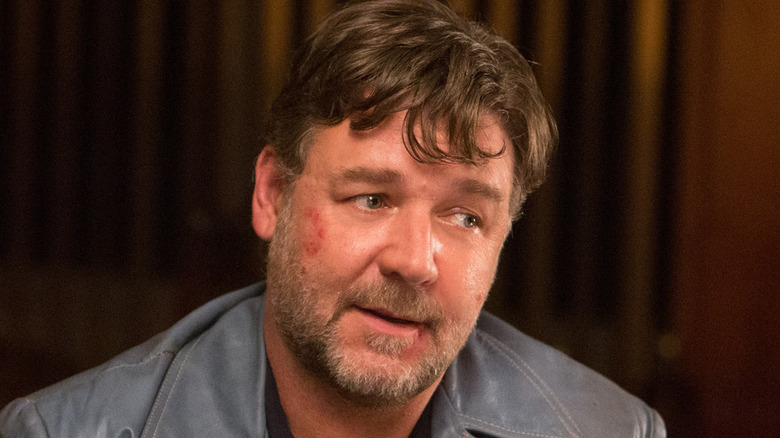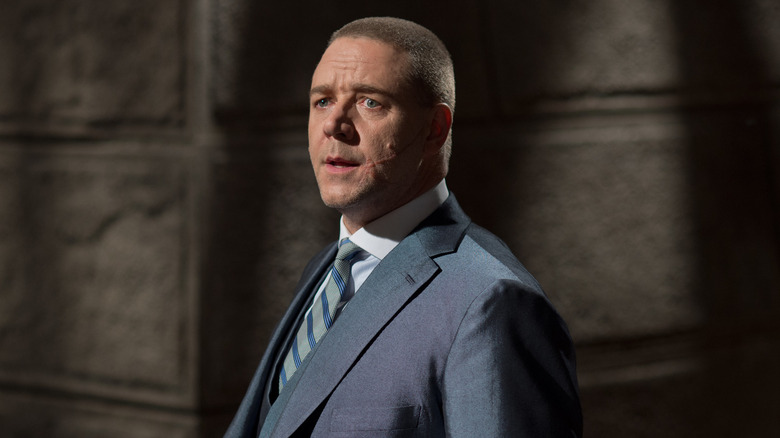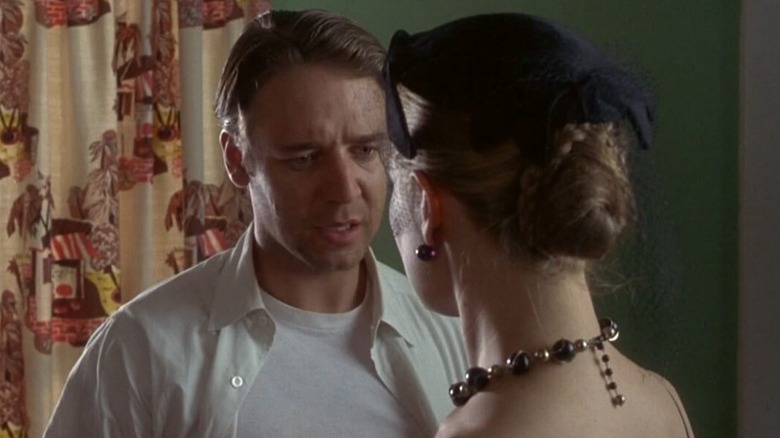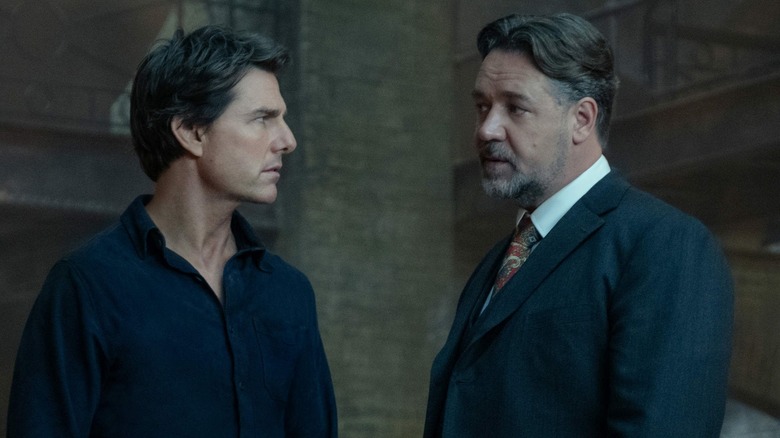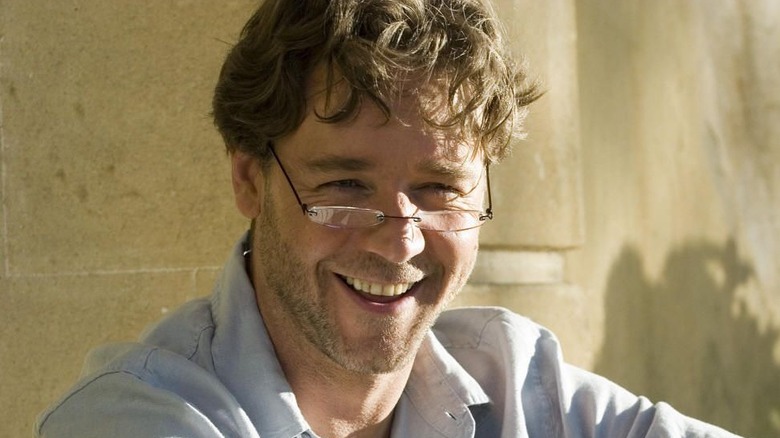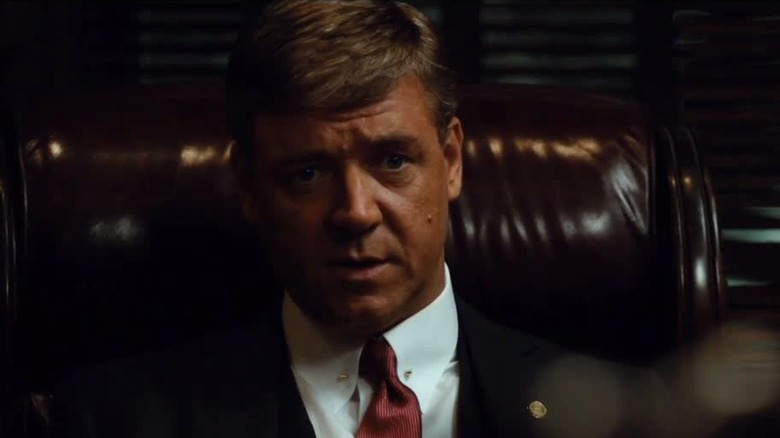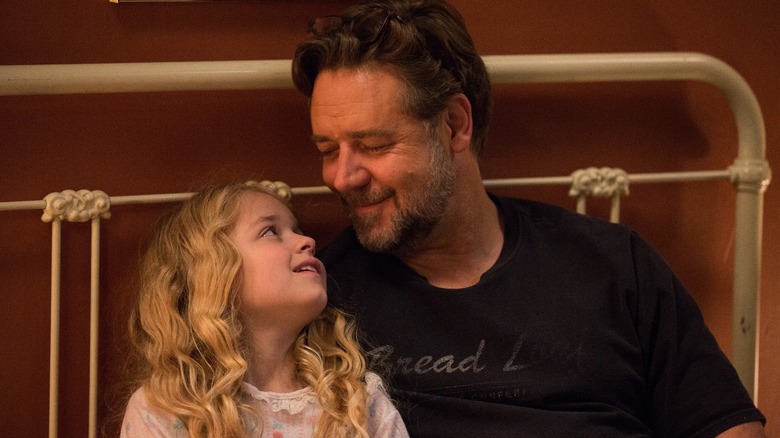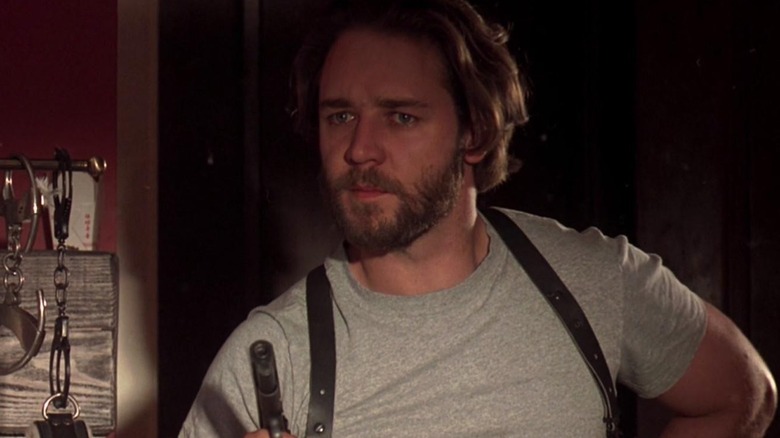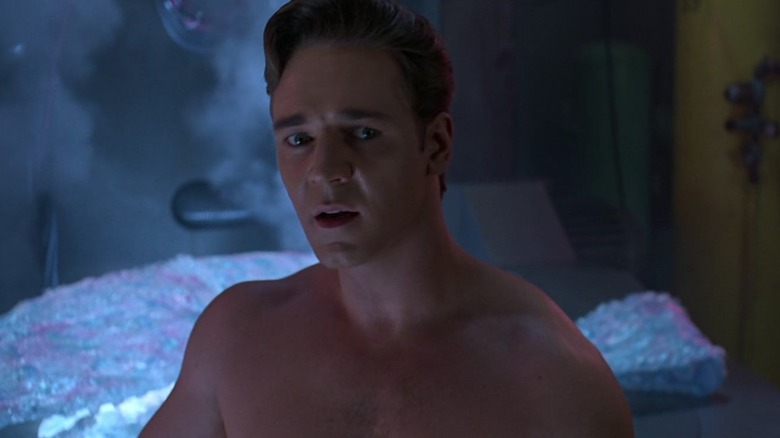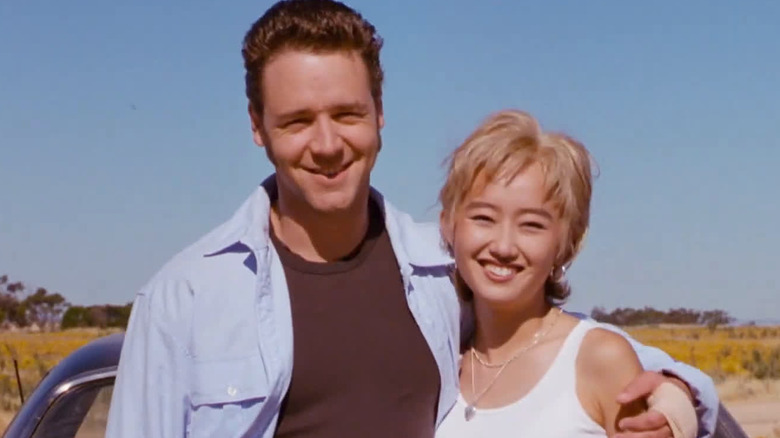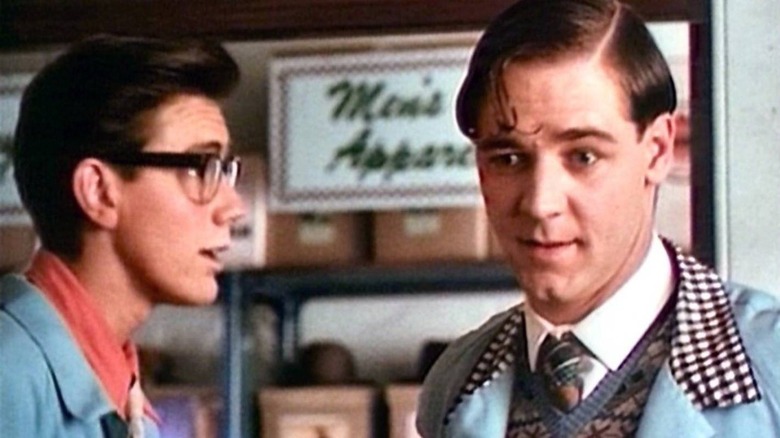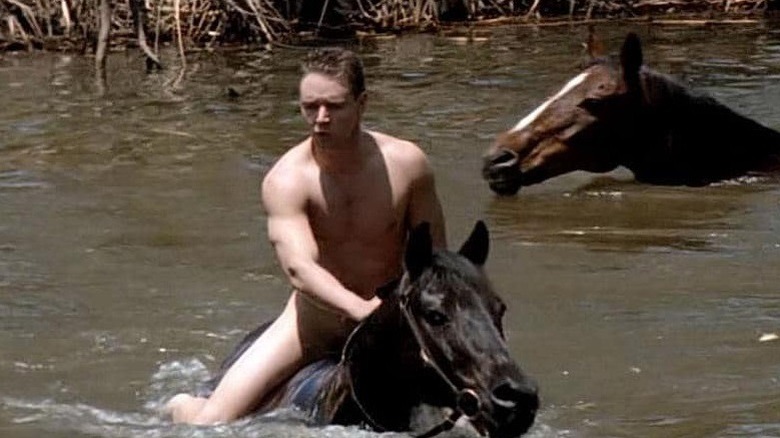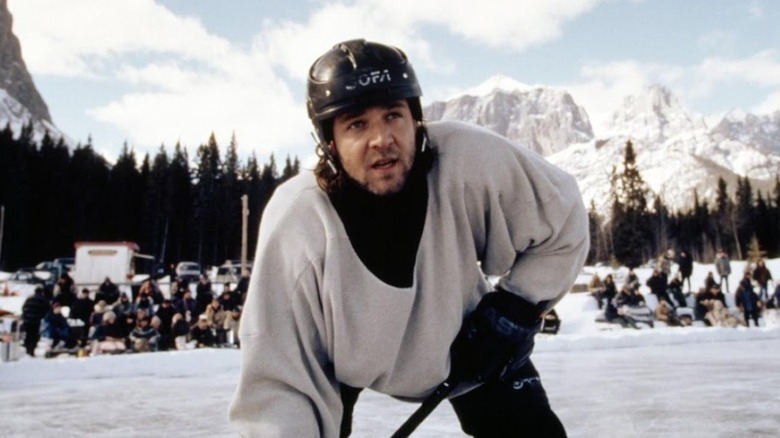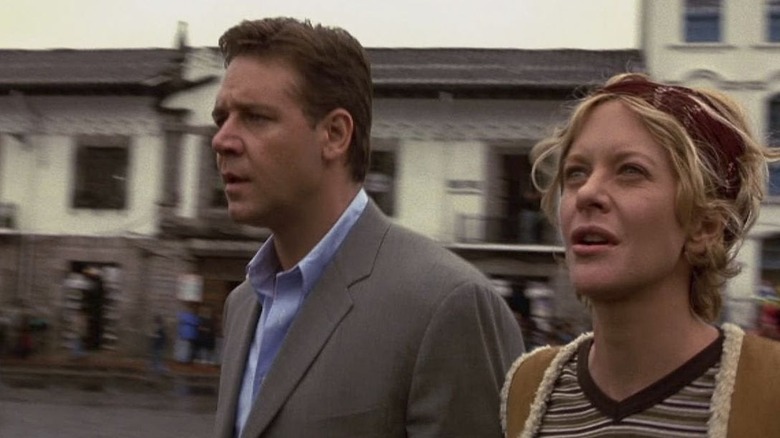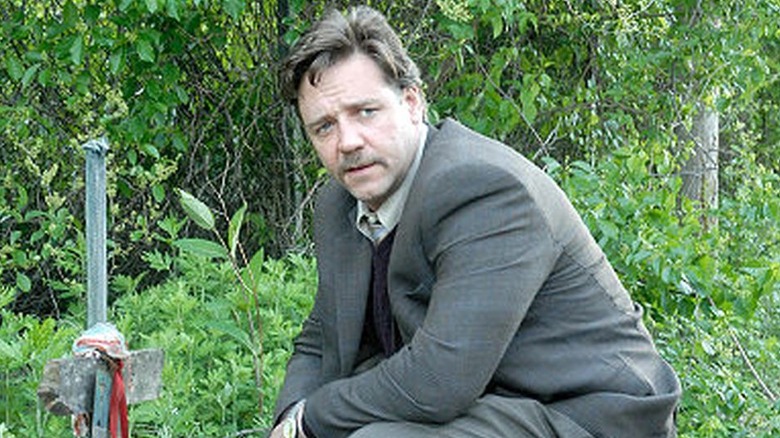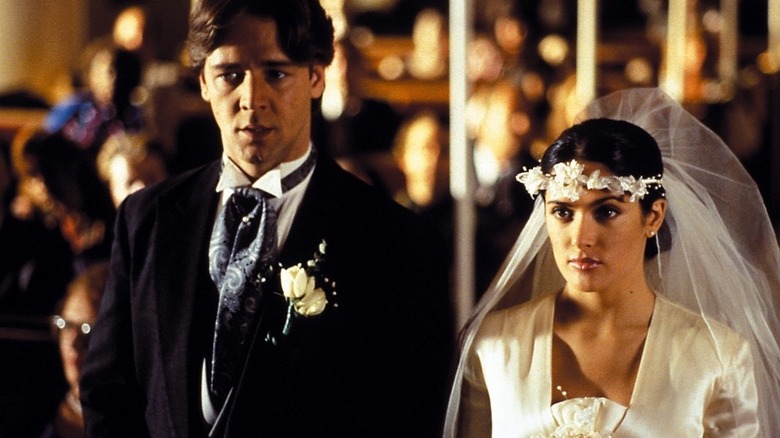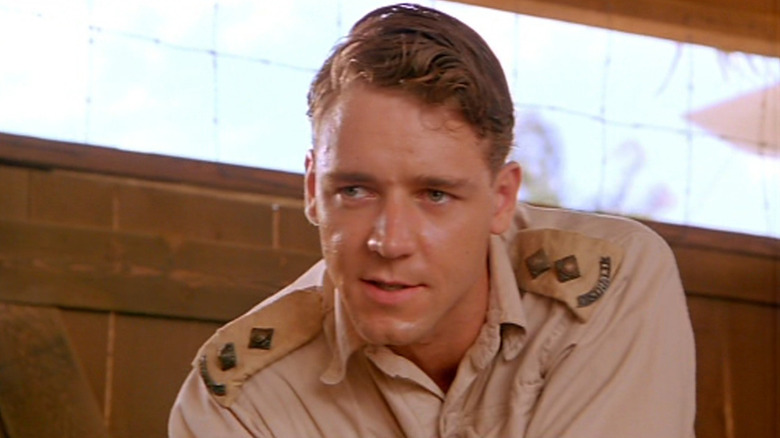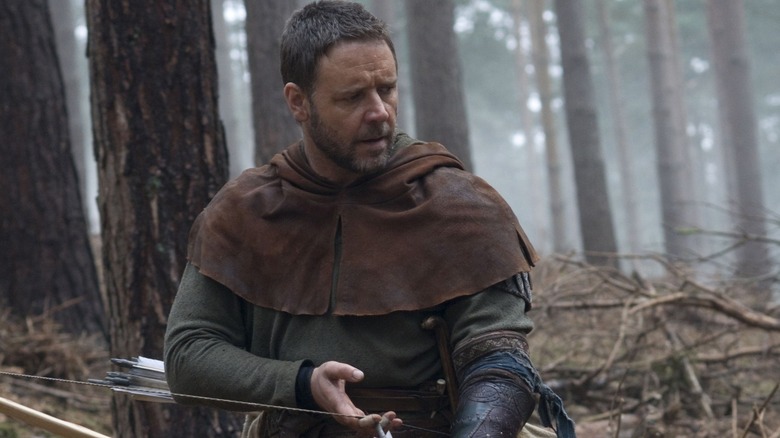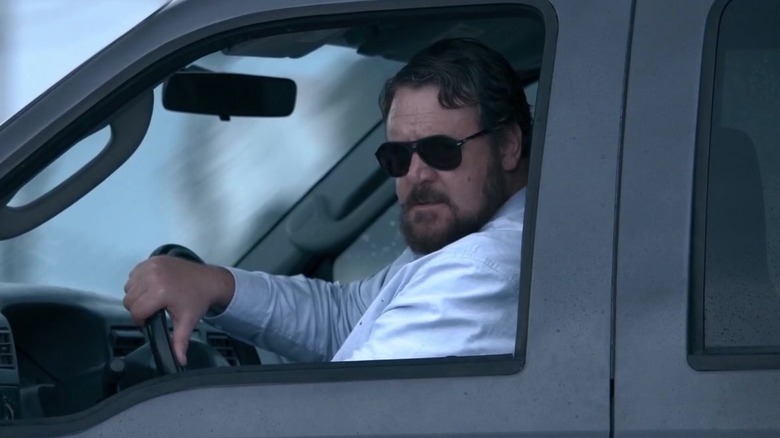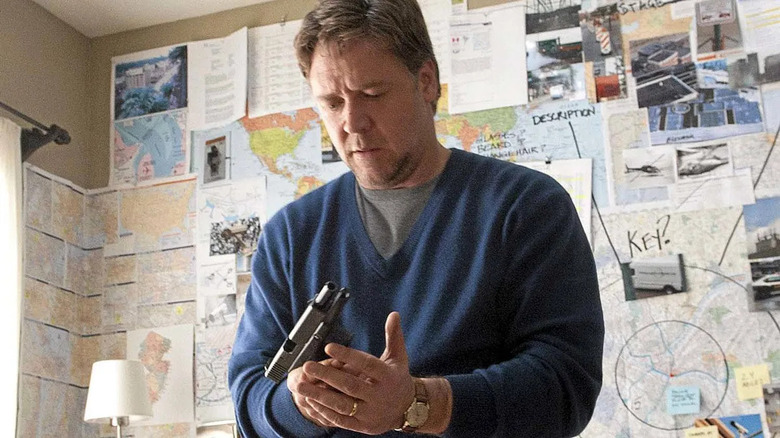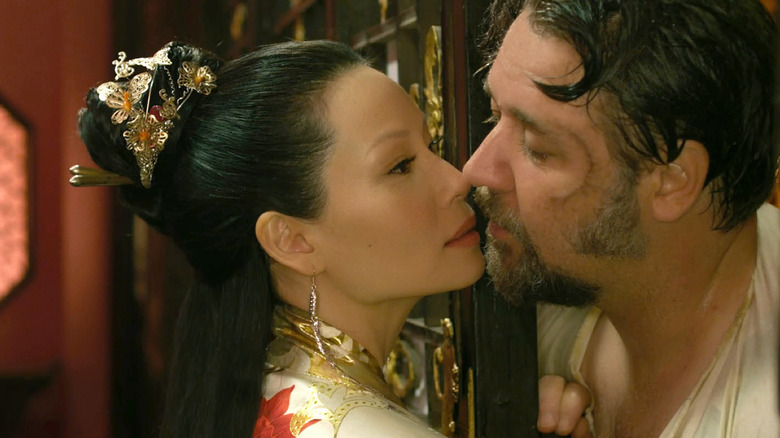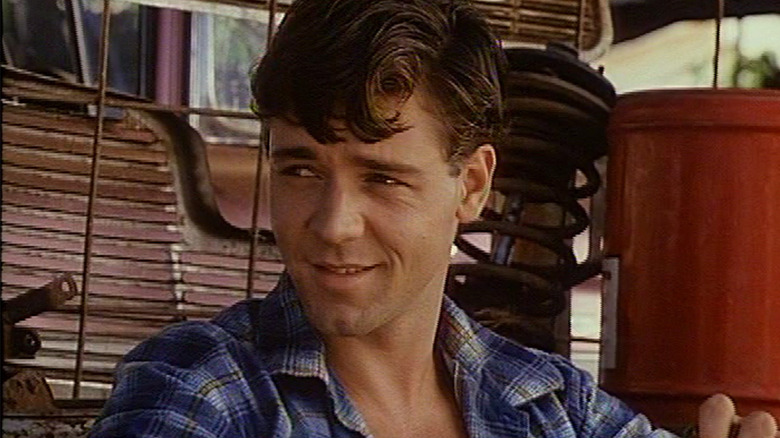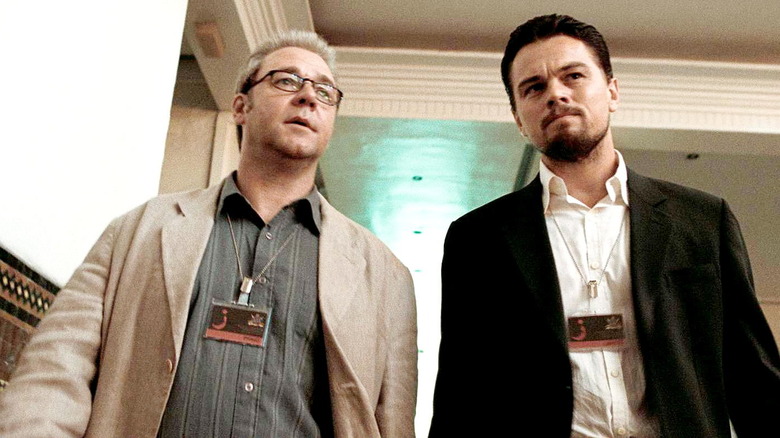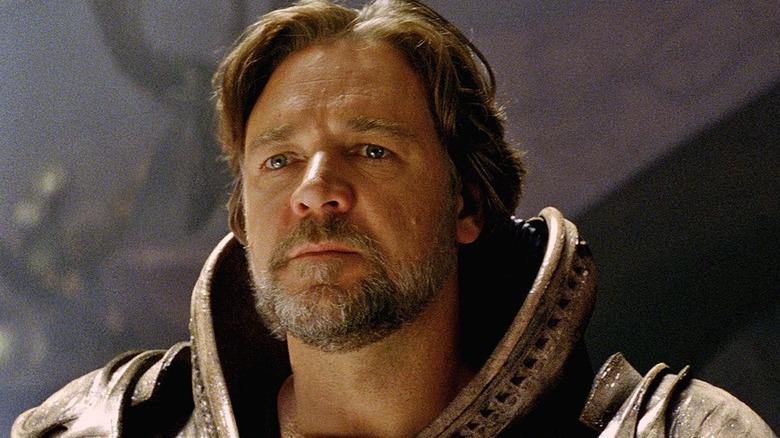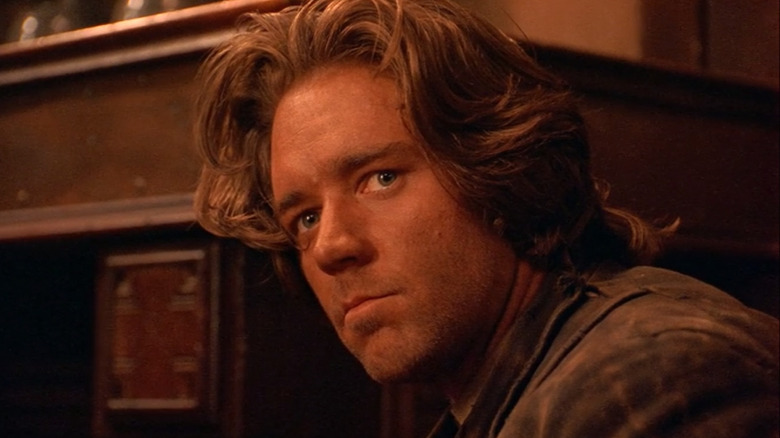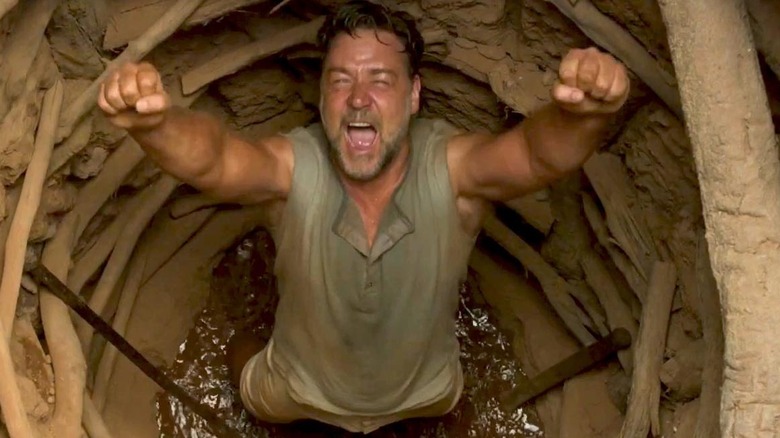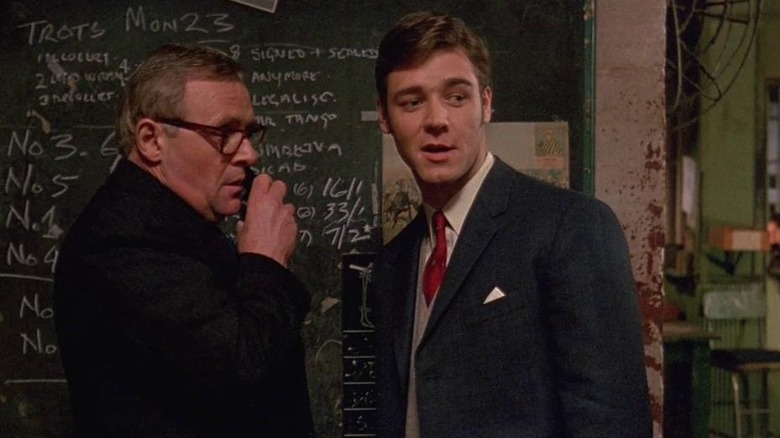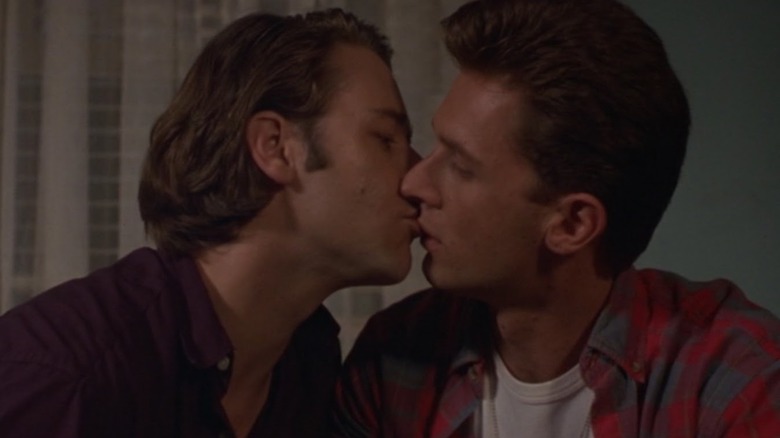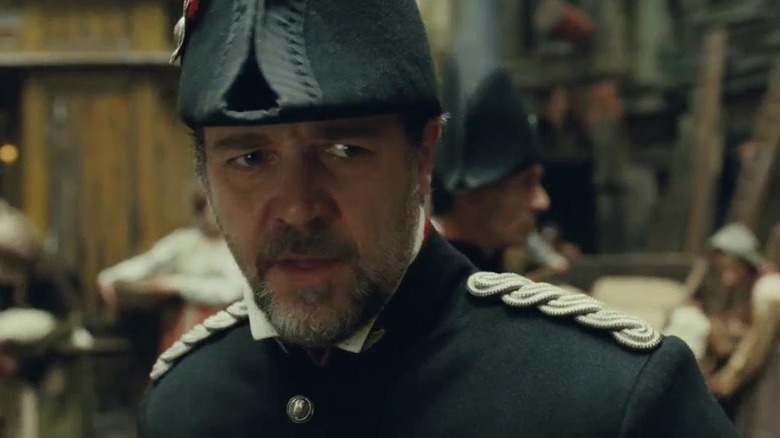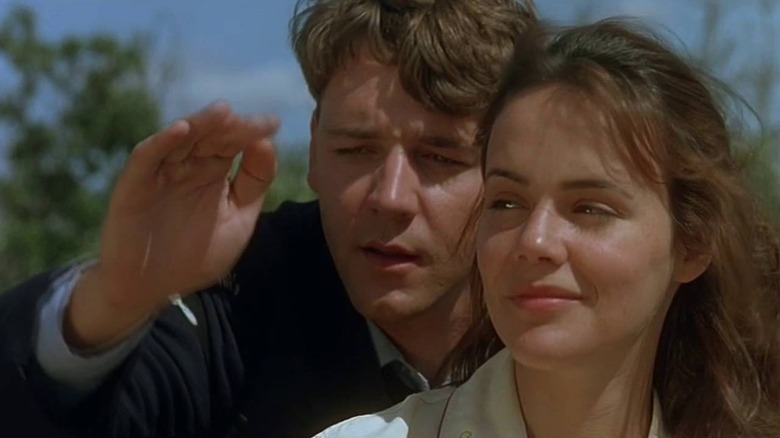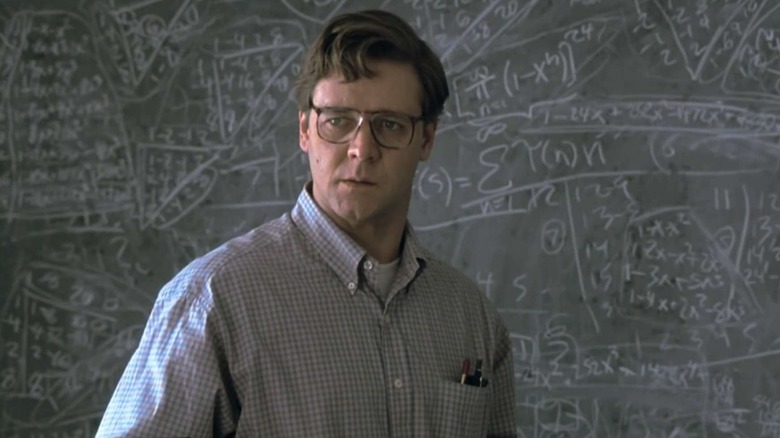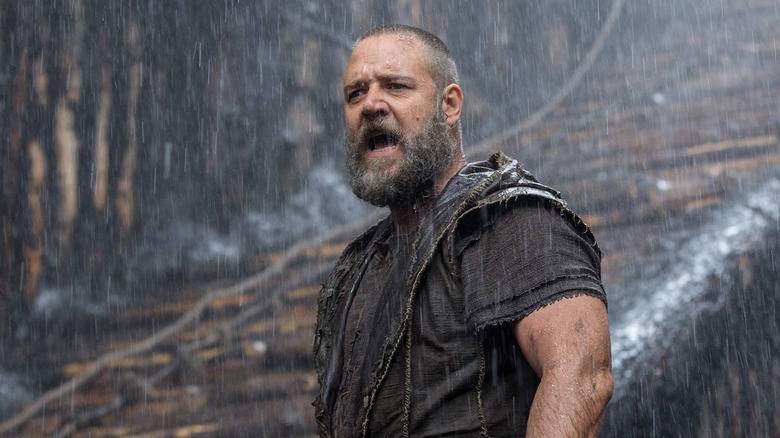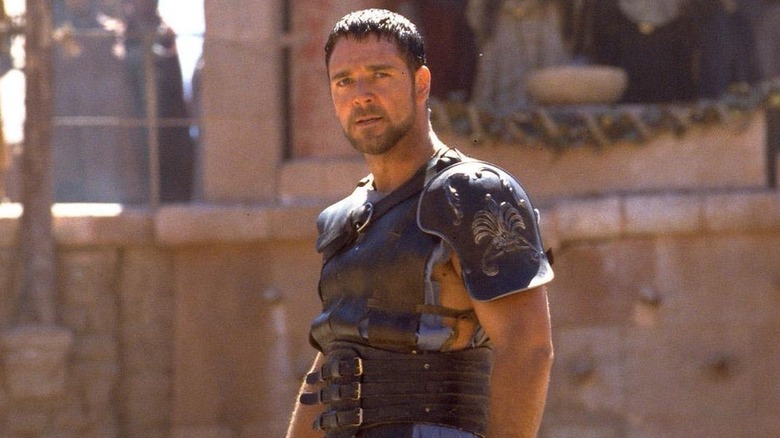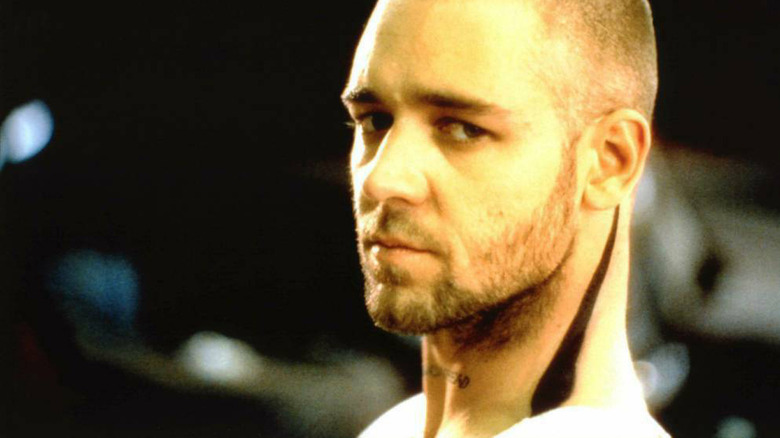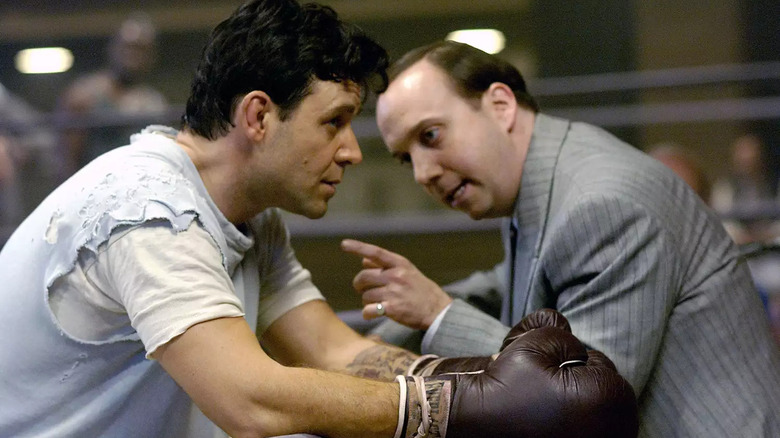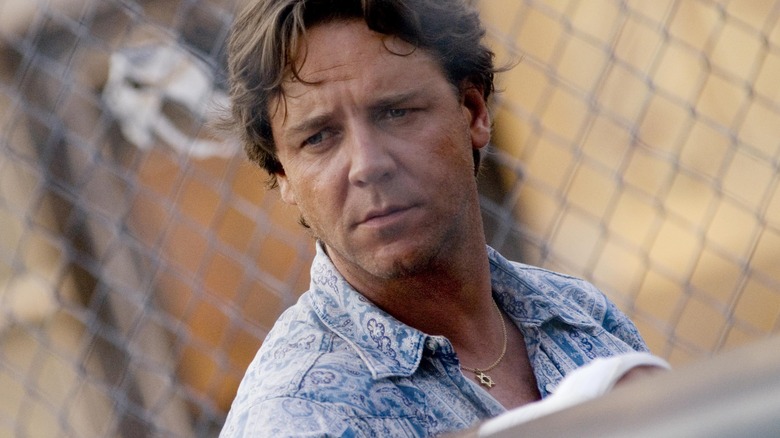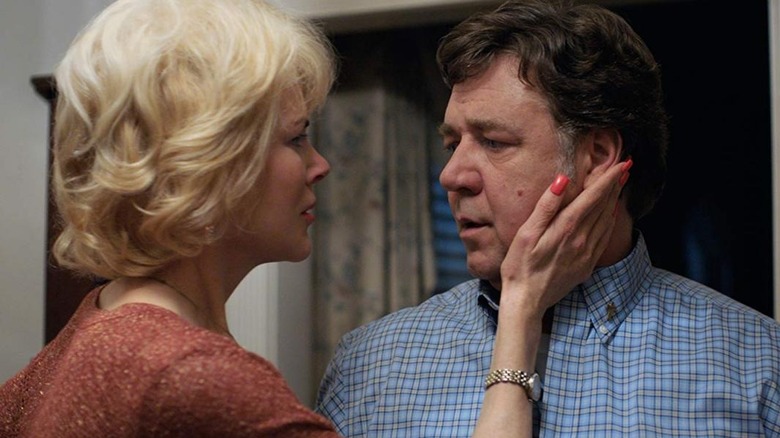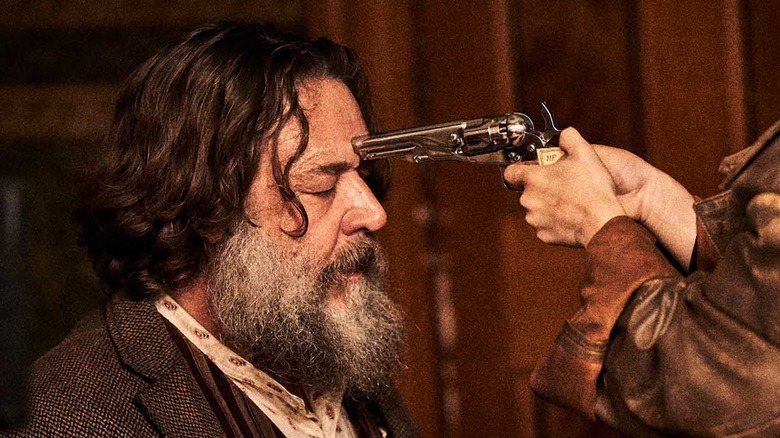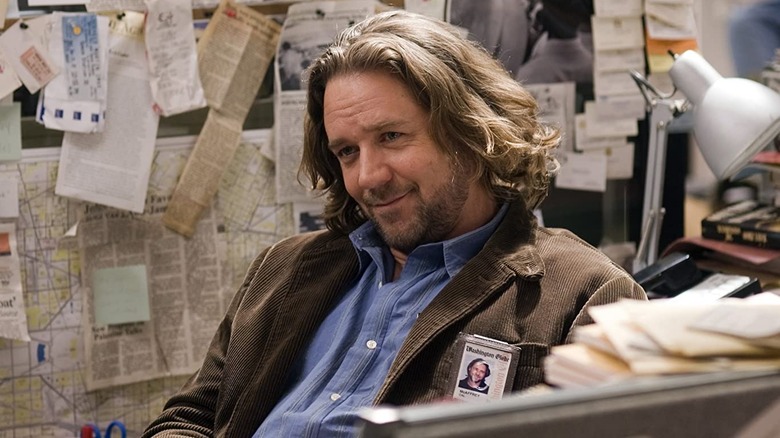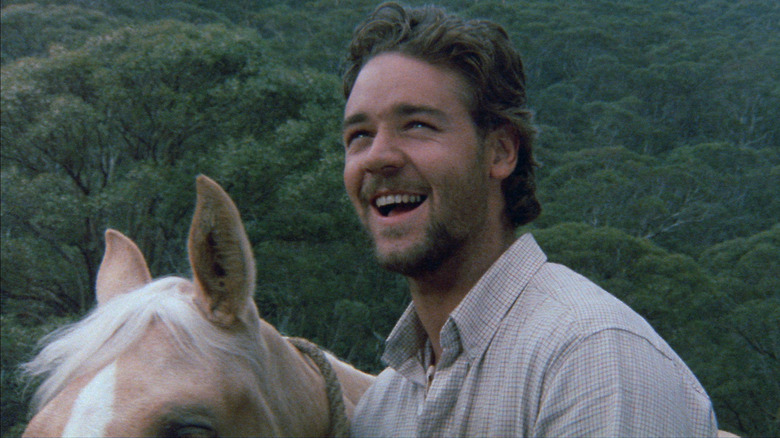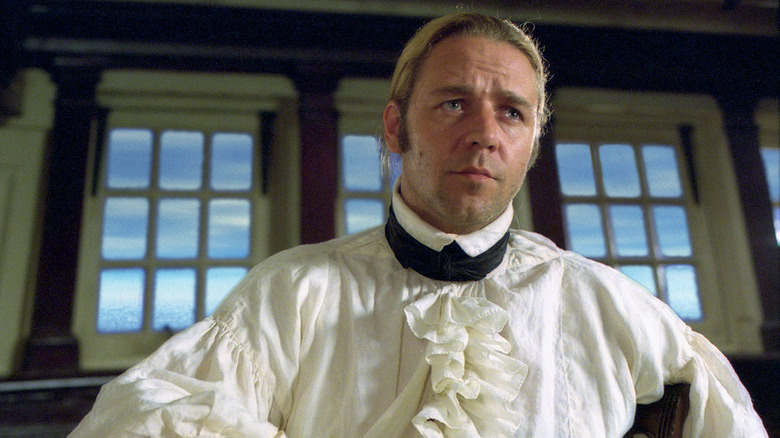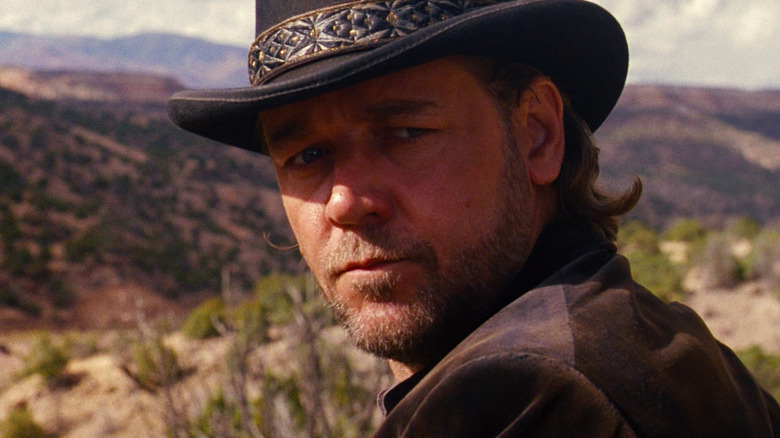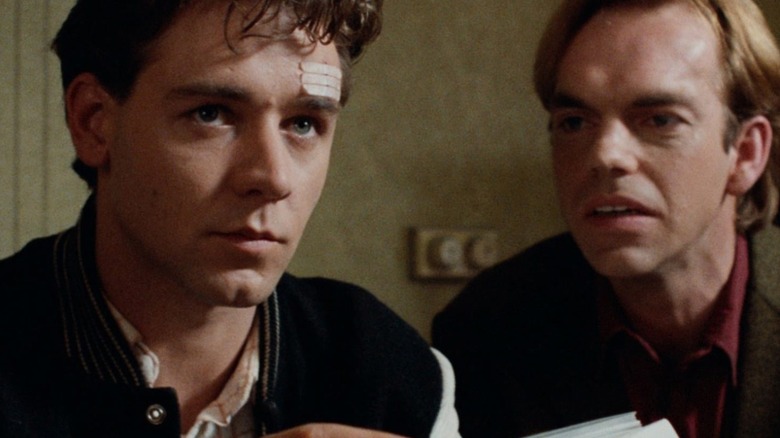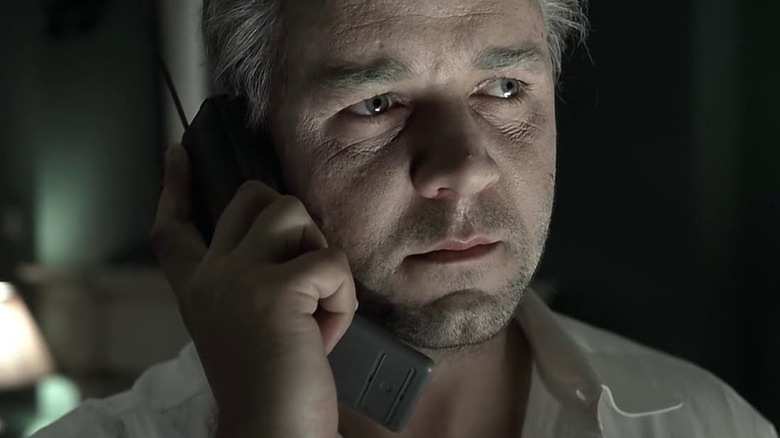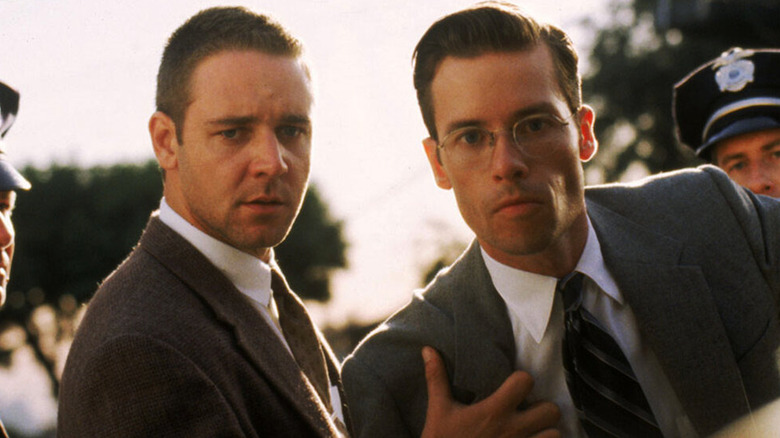Every Russell Crowe Movie Ranked Worst To Best
We may receive a commission on purchases made from links.
Russell Crowe made a career for himself in his native New Zealand and Australia before making his way to America and becoming one of Hollywood's biggest stars. Crowe made his acting debut as a child in various Australian TV shows in the 1970s, but didn't make his cinematic debut until 1990. Today, he's known for playing numerous tough-guy authority figures, from filling Marlon Brando's shoes as Jor-El in Zack Snyder's "Man of Steel" to single-handedly defying the Roman Empire in Ridley Scott's "Gladiator." At this stage in his career, Crowe has firmly cemented his place as the go-to middle-aged badass for all seasons. Of course, like all leading men, he frequently dips into more experimental fare, be they awards season contenders like "Boy Erased" or gutsy genre turns like "Unhinged."
It's time to take full stock of the actor's career by looking at every Russell Crowe movie, ranked from worst to best. We won't include his television work, like his turn as Roger Ailes in the Showtime miniseries "The Loudest Voice," or upcoming movies, like "Thor: Love and Thunder." With the formalities out of the way, let's examine the filmography of Australia's favorite barrel-chested hunk.
Winter's Tale
On paper, 2014's "Winter's Tale" should be fascinating. Written and directed by Akiva Goldsman, the film plays out like a fairy tale about a young man (Colin Farrell) who turns against his adoptive father figure, a supernatural demon played by Russell Crowe who takes the form of a New York City gangster. The film has a sweeping scope, set over the course of 100 years, and features a strong supporting cast that includes Jennifer Connelly and Will Smith as Satan himself.
Unfortunately, critics tore "Winter's Tale" apart, citing its self-importance and false gravitas masquerading as sincerity. Basically everyone in the film is miscast; Colin Farrell is too old for his role, while Russell Crowe fails to convey any sort of meaningful menace as a demonic gangster. The production design is nice, making good use of its New York City setting and shooting locations, but aside from that, there's not much nice to say about "Winter's Tale." Still, even if it's a failure, it's a well-intentioned failure, and there's grace and solace to be found in the effort of the filmmakers.
Rough Magic
"Rough Magic" is little remembered these days, maybe because it didn't release in the United States until 1997, two years after it made its European debut. Still, for those who remember it, "Rough Magic" is weird, if nothing else. Based on the novel, "Miss Shumway Waves a Wand," by James Hadley Chase, "Rough Magic" follows a young woman on the run (Bridget Fonda) who drinks a shamanistic potion that gives her magic powers. These powers influence her relationships, particularly with a film noir-tinged private eye played by Crowe. The results are a magic-enhanced screwball comedy with detective elements. Simply put, "Rough Magic" is not your typical rom-com. That doesn't mean it's particularly good, but it's certainly unique.
The film is absurd and sometimes even entertaining, and it might even be a cult classic if enough people knew it existed. As it is, though, "Rough Magic" is a forgotten piece of cinema history and one of Russell Crowe's final films before he truly broke out into the mainstream with "L.A. Confidential" in 1998.
The Mummy
"The Mummy" was Universal's failed attempt to launch a Marvel-esque shared universe around their roster of classic monsters. Plans were in place to launch films based on Dracula, Frankenstein, The Creature from the Black Lagoon, The Invisible Man, and more. But first, the universe would launch with a reboot of "The Mummy."
Unfortunately, "The Mummy" was a critical disaster that bombed at the domestic box office. While it was able to limp its way to a total global haul upwards of $400 million, it wasn't enough for the studio to move forward with the franchise, especially since the film was universally reviled by pretty much everyone who saw it. Though reports vary, some sources place the blame at the feet of star Tom Cruise, who had an unprecedented degree of creative control over the project. Crowe appears in a supporting role as Dr. Jekyll, who exists for no other reason than to set up a larger cinematic universe that would never come. At least Crowe gets to ham it up as the character, particularly when he briefly transforms into his alter ego, Mr. Hyde.
After the failure of "The Mummy," all subsequent "Dark Universe" films were quietly canceled, with Blumhouse Productions taking charge of a new version of "The Invisible Man." The film became a box office success and established the "Dark Universe" as dead and buried after just one film.
A Good Year
Ridley Scott has always been something of a cinematic chameleon, directing epic action films, esoteric science fiction masterpieces, and more grounded, realistic fare. With "A Good Year," he attempted to make a traditional romantic comedy. For better or worse, he succeeded, as "A Good Year" is a completely innocuous, middle-of-the-road non-entity of a movie.
Crowe stars as Max Skinner, a stock trader who inherits his late uncle's vineyard. He goes out to the estate and reevaluates his life and his relationships. Along the way, the film ventures fairly deeply into the world of winemaking, which is as interesting as you might expect. Then again, "A Good Year" does feature a memorable tennis match, which feels almost like a parody of the earlier collaboration between Scott and Crowe, 2000's "Gladiator." All in all, "A Good Year" is mild-mannered and harmless, and there's nothing inherently wrong with that... There's nothing memorable about it, either.
Broken City
Released in 2013, "Broken City" stars Mark Wahlberg as a disgraced NYPD cop who gets involved with the city's corrupt mayor after he hires him to investigate his wife (Catherine Zeta-Jones), since he suspects she might be stepping out on him. If this sounds like the setup for pretty much every film noir movie ever made, that's because "Broken City" colors within the lines of its genre. That's not necessarily a bad thing, but anyone with a cursory knowledge of film noir trappings won't be surprised by any of the myriad twists and turns taken in the script.
Perhaps because of its predictability, "Broken City" feels like a warm blanket of noir tropes. It has a strong sense of style courtesy of director Allen Hughes ("Menace II Society," "The Book of Eli"), who frequently works alongside his brother, Albert. Overall, for audiences looking for a grim romp through New York's seedy underbelly, there might be countless better options, but you could do a lot worse than "Broken City."
Fathers & Daughters
"Fathers & Daughters" features a truly impressive cast. In addition to Crowe, the film also stars Amanda Seyfried, Aaron Paul, Diane Kruger, Jane Fonda, and Bruce Greenwood, and features an original song written and performed by Michael Bolton. Unfortunately, pretty much everything else in the film is emotionally manipulative drivel that strives to be a romantic melodrama, but fails to inspire anything more than boredom.
Crowe plays Jake Davis, an author trying to raise his daughter after nearly dying in a car crash that kills his wife and leaves him with brain damage that causes seizures. That's just the tip of the melodramatic iceberg. If you're looking for a movie with an all-star cast and a script that reads like a third-rate episode of "This Is Us," then maybe "Fathers & Daughters" will hold some value for you. Otherwise, there's not much here for anyone but the most die-hard Russell Crowe fans.
No Way Back
This oft-forgotten 1995 low-budget action flick marked one of Crowe's earliest American films, after Sam Raimi's "The Quick and the Dead," but more on that one later. "No Way Back" follows Crowe as Zack Grant, an FBI agent whose son is kidnapped by gangsters. While still relatively unknown in the United States, Crowe is charismatic as a hard-boiled federal agent pushed to the edge, though the movie doesn't have much to offer beyond his "'90s Action Hero" charisma.
"No Way Back" features a supporting cast of stock 1990s cutouts, including Helen Slater as the plucky comic relief and Michael Lerner as a ruthless gangster. Japanese actor Etsushi Toyokawa is noteworthy in his first American film, as is "90210" alum and future "Sharknado" star Ian Ziering, who plays a low-rent thug. Actually, the film is worth watching just to see Ziering as a tatted-up skinhead, even though he gets killed off in the first act.
Virtuosity
"Virtuosity" marks the first collaboration between Russell Crowe and Denzel Washington. Unfortunately, it's not nearly as beloved as their second team-up, "American Gangster," but we'll get to that later.
Directed by Brett Leonard, "Virtuosity" never attained the cult fandom of his earlier film, "The Lawnmower Man," but it still has its fans, mostly thanks to Crowe's performance as a killer A.I. set loose in the real world. Washington stars as Parker Barnes, a disgraced cop who finds his worst enemy has been re-created in a Virtual Reality program. When SID 6.7 (Crowe), as he is called, is given an artificial body, all hell breaks loose, and it's up to Barnes to save the day as the body count rises.
While much of the technobabble and cyber-tech used in the film feels hilariously outdated by today's standards, "Virtuosity" still has its charms, just like "The Lawnmower Man." If you're willing to go along with its particular cyber-horror energy and accept its inadvertent "retro-future" sci-fi aesthetic, there's still some fun to be had for genre aficionados.
Heaven's Burning
"Heaven's Burning" came out in 1997, just two months after "L.A. Confidential." Since the latter film turned Crowe into a full-on Hollywood hunk, "Heaven's Burning" is best known for being Crowe's final Australian film for 17 years. He wouldn't return to Australian cinema until 2014's "The Water Diviner."
Crowe stars as Colin, a getaway driver for a gang of robbers. Meanwhile, Midori (Youki Kudoh) is trying to get out of her marriage to a ruthless criminal on her honeymoon, but her plan to escape is altered when she's kidnapped by Colin's gang during a robbery. Colin and Midori wind up having natural chemistry and embark on a thrilling road trip together, with Colin's old gang, Midori's husband, and the police in hot pursuit.
The film manages to engage viewers with a mix of deep characterization and exciting action, even if the plot takes itself a bit more seriously than it probably should. Still, like most of Crowe's Australian oeuvre, "Heaven's Burning" is largely unknown to American audiences. Fans of Crowe should definitely seek this one out and give it a chance.
Love in Limbo
A romantic sex comedy set in the 1950s, "Love in Limbo" could best be described as "'Porky's,' but Australian." Crowe plays a supporting role as a comically joyless clothing store manager, but the lead role is played by Craig Adams. He plays a teenager who is expelled for peddling his sexually explicit drawings, but he's still a virgin and wants to remedy that situation. Much of the film's humor comes from the paradoxical nature of young, horny teens trapped in a sexually repressed time, yet surrounded by a rock-and-roll culture that celebrates unabashed sexuality.
Released in 1993, "Love in Limbo" is a gorgeous film that really makes the most of its 1950s setting, which adds a charming sense of innocence to the lewd humor. The story and humor are basically ripped off from any number of sex comedies that were already a decade old by the time "Love in Limbo" was released. Nevertheless, "Love in Limbo" is a lowbrow romp that's sporadically entertaining and more or less inoffensive.
Hammers Over the Anvil
"Hammers Over the Anvil" is remembered for being the movie where a naked Russell Crowe rides a horse wading through the water. Presumably, other things happen in the film, but nobody remembers anything but the sight of Crowe's naked body on the luckiest horse in Australia.
Jokes aside, "Hammers Over the Anvil" tells the story of a young man (Alex Outhred) who idolizes a local horse trainer (Crowe), who, in turn, is having an affair with an older married woman (Charlotte Rampling at her most gorgeous). It's a coming-of-age story inspired by the life of Alan Marshall, who wrote the novel on which the film is based. The original novel is more like a series of vignettes than a straightforward narrative, which gives the film some creative leeway in terms of adapting the source material.
As a final note, the film's score is composed by the Australian band, Not Drowning, Waving, which shouldn't be confused with the New York City-based rock and roll band, Not Waving But Drowning.
Mystery, Alaska
Released in 1999, "Mystery, Alaska" is a sports comedy about a group of hockey enthusiasts from the fictional town of Mystery, Alaska, who inexplicably get the chance to play an exhibition match against the New York Rangers, a prominent force in the NHL. It's a classic story of underdogs taking on an overwhelming challenge, and it's bolstered by a fantastic cast that includes Burt Reynolds as a small-town judge who has to coach the ragtag team of small-town hockey players into contenders who can take on one of the best teams in the NHL.
In real life, Crowe is quite the sports enthusiast, but his game of choice is rugby, not hockey. Still, he does a great job in "Mystery, Alaska," which culminates in a pretty epic game between the Mystery team and their NHL counterparts. Overall, "Mystery, Alaska" moves along at a steady clip thanks to director Jay Roach. While not as cartoonish in its comedy as his more famous films, "Austin Powers" and "Meet the Parents," it still features its fair share of character-driven humor. It doesn't quite reach the heights of 1970s classics like "Semi-Tough" or "The Longest Yard" (both of which also star Burt Reynolds), but it's still a fun time for hockey enthusiasts or fans of underdog stories.
Proof of Life
When the husband of Alice (Meg Ryan) is kidnapped by South American guerilla fighters, she hires Terry (Russell Crowe), an expert at kidnapping/ransom situations. That's the basic premise of "Proof of Life," a 2000 thriller that can't decide if it wants to be an action movie or a romantic drama, and ultimately fails to be either. Even though the romantic storyline is handled as reasonably well as can be expected, it's just hard to sympathize with either Ryan or Crowe when they're making sexy eyes at each other while Alice's husband (David Morse) is locked in a hole by bad guys.
On the action front, the movie gets a shot in the arm due to the presence of David Caruso, who is having a blast as Dino, an ex-Green Beret friend of Terry's who helps out when they finally resolve to charge into battle and rescue Alice's husband by force. For the most part, "Proof of Life" is kind of a snooze fest, neither romantic nor exciting enough to satisfy anyone. At the end of the day, critics were unimpressed and audiences were lukewarm; "Proof of Life" failed to make back its budget at the global box office, stalling out at just $62 million.
Tenderness
"Tenderness" follows Detective Cristofuoro (Crowe) as he investigates a teenager (Jon Foster) he believes to be a psychotic murderer, while trying to protect a young woman (Sophie Traub) he believes may be his next victim. The story jumps between the perspectives of these three characters, but this only disguises the fact that it's a straightforward story with little in the way of unexpected twists or novel turns. Still, that doesn't mean "Tenderness" is a disaster. It's actually a competent little character study, with each of the characters feeling quite different based on the film's shifting perspectives. Additionally, the film is shot in various locations in New York state, including Staten Island and Rockland County, showing off parts of the area that most movies tend to ignore in favor of the bright lights of midtown Manhattan.
Notably, "Tenderness" is directed by John Polson, who previously co-starred alongside Crowe in the Australian film "The Sum of Us," which can be found a bit further down in this story. Alas, critics were dismissive of "Tenderness," and the film was quickly forgotten, even failing to secure a theatrical release in the United States.
Breaking Up
Michael Cristofer's play "Breaking Up" was first performed in 1990. Several years later, he wrote a cinematic adaptation, which was released in 1997. Crowe stars alongside Salma Hayek as a couple whose relationship is on the rocks. As the characters look back on their doomed courtship, the film explores how relationships between seemingly perfect pairs wind up hitting the skids.
"Breaking Up" was met with mixed reviews, with Variety calling out the poor chemistry between its unlikable lead characters, though other outlets were more friendly towards the film's anti-rom-com sensibilities. Additionally, even the harshest critics had nothing but praise for the film's musical score, provided by Mark Mothersbaugh of Devo fame. When the dust settled, "Breaking Up" did nothing for the careers of its stars. While not a disaster by any means, it failed to propel them to any new heights of acclaim. "Breaking Up," like so many real-life relationships reflected in the film, is nothing more than an occasionally entertaining waste of time.
Prisoners of the Sun
Some viewers may know "Prisoners of the Sun" by its alternative title, "Blood Oath." Either way, this 1990 World War II drama marks the feature film debut of Russell Crowe, who plays a relatively minor role. The film is inspired by the real-life trials of Japanese war criminals. The film also marks the cinematic debut of Jason Donovan and features Terry O'Quinn, George Takei, and Deborah Kara Unger in supporting roles.
Director Stephen Wallace felt the film was more overwrought than it should have been, as he told Signis in 1998. Still, he felt the need to make a film that shined a spotlight on the inhumane conditions and high mortality rates of Japanese POW camps during WWII, and remained proud of the result, even if it wasn't exactly what he had in mind when he signed on to the project. While overwrought with unnecessary melodrama, "Blood Oath" is still an essential war film that tells the story of a side of war that is often overlooked or misrepresented (While "Hogan's Heroes" is a beloved piece of sitcom history, it's not exactly an accurate portrayal of POW camps).
Robin Hood
Ridley Scott's "Robin Hood" was fraught with controversy. Its original, high-concept take on the classic story drew lots of attention when it first made the Hollywood rounds, only for Scott to have it rewritten to reflect a more traditional take on the iconic outlaw, a puckish rogue who steals from the rich and gives to the poor. Still, while a far cry from what could have been, there is still some merit to be found in this 2010 adaptation of the Robin Hood mythology.
"Robin Hood" failed to impress at the box office, grossing just $321 million off a mammoth budget of $200 million, far short of breaking even. While roundly dismissed in its day, it's since become something of a cult classic. The home video version restores 15 minutes of cut footage that helps the movie flow better and feel more coherent. Horrible accent notwithstanding, Crowe's nuanced performance as an older version of the hero is richly textured, with many layers for cinema enthusiasts to pore over. While not rated R, the action and aesthetics of "Robin Hood" feel like something of a follow-up to an earlier Scott/Crowe collaboration, 2000's "Gladiator." Finally, on a more cynical note, the abject critical and commercial failure of the 2018 "Robin Hood" film makes this version look significantly better in comparison.
Unhinged
"Unhinged" stars Russell Crowe as a mysterious man who harasses Rachel (Caren Pistorius) after a road rage incident. His anger quickly escalates to assault and murder, sending Rachel on a quest for survival. Of course, the raison d'être for "Unhinged" is to see Russell Crowe as a completely over-the-top villain. There are political implications to be made regarding a story involving a divorced, middle-aged white man in a gas-guzzling SUV driven by pure rage, but that might be giving too much credit to a film that exists for no other reason than to allow Russell Crowe to terrify and entertain theatergoers.
Notably, "Unhinged" had its release date shuffled around many times before finally launching in August 2020, as it was the first wide theatrical release following the advent of the coronavirus pandemic. The film ultimately managed to gross over $20 million at the domestic box office. That may not seem like much, but it felt like a genuine blockbuster in the dark days of mid-2020. In short, "Unhinged" was the first step in bringing the movie theater industry back from the brink of oblivion during the pandemic.
The Next Three Days
Written and directed by Paul Haggis ("Crash," "Million Dollar Baby"), "The Next Three Days" stars Russell Crowe as John, the husband of Lara (Elizabeth Banks). Wrongfully convicted of murder, Lara loses her last appeal and is sentenced to life in prison, so John decides to take matters into his own hands and rescue her from her unfair fate. The resulting adventure is a white-knuckle thriller that offers a unique take on the vigilante sub-genre; it's a "vigilante rescue mission," not a typical quest for vengeance or a righteous killing spree. There's still a fair amount of gunplay, if not enough to satisfy action fans looking for a spiritual successor to "Taken" (Liam Neeson even has a brief role, though he doesn't partake in any action sequences).
"The Next Three Days" grossed $67 million at the worldwide box office. With a budget of just $30 million, the film likely broke even with those numbers, but it wasn't enough to make any kind of noteworthy splash. Still, "The Next Three Days" is a tight little thriller about a husband who would do anything to protect his wife from a miscarriage of justice.
The Man With the Iron Fists
RZA is best known for his tenure in Wu-Tang Clan, one of the greatest rap groups of all time. However, he's also built a solid side career as a Hollywood star, appearing in movies like "American Gangster" and "Derailed." He also produced the musical score to Quentin Tarantino's "Kill Bill" duology. In 2012, RZA made his directorial debut with "The Man With the Iron Fists."
RZA himself stars as the title character, but the supporting cast is full of top-tier ringers, including Lucy Liu, Dave Bautista, Pam Grier, and Russell Crowe. In a film filled with over-the-top characters, Crowe stands out as Jack Knife, a British soldier who saves the titular character and helps him build the eponymous "iron fists" he uses in combat.
"The Man With the Iron Fists" doesn't take itself too seriously. In tribute to the 1970s Hong Kong action films that inspired him in his youth, RZA crafted his take on the genre, adding a bit of his Wu-Tang magic to the mixture. The result, while low-budget and clearly rushed in some areas, is crafted with care by a director with a deep love for the action and themes of Hong Kong martial arts cinema.
The Crossing
Released in 1991, "The Crossing" marked Crowe's first outing as a leading man in a feature film. His performance took Australia by storm, and his work on the film won him the Australian Film Institute Award for Best Actor. Crowe plays Johnny, a man caught in a love triangle between his girlfriend and his best friend, Sam, who returns home after being away for some time. The friendship between the two men naturally turns into a feud that quickly spirals out of control.
Aesthetically, the film benefits from its 1960s setting, with the soundtrack comprised mainly of contemporary Australian bands performing covers of some of the greatest rock and roll songs of the era, but fans of Crowe's personal life know the film because it's where he met his future wife, Danielle Spencer. After a period of on-again, off-again romance, they married in 2003 and had two children together. It seems nothing in Hollywood lasts forever, though, as they divorced in 2018.
Body of Lies
Another Ridley Scott/Russell Crowe collaboration, 2008's "Body of Lies" follows the American and Jordanian governments' attempts to hunt down a terrorist leader, Al-Saleem (Alon Aboutboul). Leonardo DiCaprio plays the man in the field, a CIA operative trying to accomplish his mission without rustling the feathers of the local populace, while Crowe plays his America-based handler, who wants Al-Saleem dead or alive, by any means necessary. Meanwhile, Mark Strong plays a Jordanian agent also trying to take down Al-Saleem. The film is about how these three men, all of whom are after the same goal, have trouble communicating and cooperating, often leaving each other out of their true agendas.
At its core, "Body of Lies" is a pretty basic spy thriller buoyed by its leads. It's also something of a time capsule regarding America's post-9/11 focus on spy antics and intelligence operations in the Middle East. As a bonus, the film features an appearance from Oscar Isaac as a CIA agent who gets killed off early on. Like many of its contemporaries that tackled America's War on Terror, "Body of Lies" failed to break out at the box office, but it's remembered fondly thanks to Scott's direction and strong performances from Crowe, DiCaprio, and Strong.
Man of Steel
Zack Snyder's 2013 interpretation of the Superman mythos introduced the world to Henry Cavill's version of DC's greatest superhero. While critics were mixed on "Man of Steel," audiences responded more enthusiastically; the reboot grossed over $668 million worldwide, spawning the DC Extended Universe. One of the film's secret weapons is its casting. In addition to Cavill's excellent performance as the eponymous Man of Steel, the film includes Michael Shannon as General Zod, Amy Adams as Lois Lane, Diane Lane and Kevin Costner as Ma and Pa Kent, and Russell Crowe as Jor-El, Superman's birth father.
The first act of the film mostly follows Jor-El as he tries to get his newborn son to the safety of Earth, the yellow sun of which will grant Kal-El powers and abilities far beyond those of mortal men. As Superman grows up and seeks his lineage, he comes across a hidden Kryptonian scout ship that allows him to speak with his birth father again, or at least an advanced A.I. representation of him.
It's not an easy task to take on a role so famously played by the legendary Marlon Brando in Richard Donner's 1978 "Superman," but the character and mythology are sufficiently flexible for Crowe and Snyder to avoid copying what had already been done before. While Crowe never returned for any further DCEU films, the essence of his character lingers with Superman. As Jor-El says before he sends his infant son into space, "Our hopes and dreams travel with you."
The Quick and the Dead
Russell Crowe made his Hollywood debut in 1995's "The Quick and the Dead," directed by Sam Raimi. While a commercial bomb upon release, the film has since developed a cult following due to its Wild West aesthetic, all-star cast, and unique premise, to say nothing of Raimi's trademark off-the-wall action sequences.
Gene Hackman plays Herod, the mayor of a small town who rules over his dominion with an iron fist and runs a sadistic quick-draw contest. Sharon Stone plays a mysterious stranger who drifts into town and has an ulterior motive for entering the fatal contest. Crowe plays Cort, a retired outlaw who now spreads the word of God as a preacher. The rest of the cast includes such ringers as Keith David, Leonardo DiCaprio, Lance Henriksen, Gary Sinise, and Woody Strode in his final film role.
As a tribute to the Western genre, the high-tension, quick-draw shootouts are the highlights of "The Quick and the Dead," and Raimi does not disappoint. Realism is cast aside in favor of style and personality, making the film's numerous shootouts feel like something from a video game or an anime (in a good way). Sharon Stone, who produces as well as stars, was responsible for hiring Raimi due to her fondness for "Army of Darkness." She also brought Russell Crowe on board after seeing his performance in "Romper Stomper."
The Water Diviner
In 2014, Russell Crowe returned to his native Australia to craft his directorial debut, "The Water Diviner." Crowe stars as Joshua, an Australian widower whose sons disappear during World War I. With nothing to lose and grief in his heart, he goes to Turkey to find out the truth of what happened to them. What follows is a harrowing war film about how difficult it is to move on from great loss, and how the price of war is always paid in blood by young people who leave behind emotionally crippled families.
"The Water Diviner" earned its fair share of critical acclaim, though it also came under fire for certain omissions in its storytelling. In particular, the Armenian genocide goes completely unmentioned, though it would have fit nicely within the themes of the film. Even so, "The Water Diviner" is an excellent film within its storytelling confines, even as it inadvertently reinforces the Turkish government's official stance of denying their century-old war crimes. It certainly didn't help matters that "The Water Diviner" hit American theaters on April 24, 2015 — exactly 100 years to the day after the Ottoman Empire launched their campaign of genocide, a day officially recognized as Armenian Genocide Remembrance Day.
Spotswood
Another entry from Crowe's 'early Australia' phase, "Spotswood," known as "The Efficiency Expert" in the United States, places Crowe opposite one of the all-time greats, Anthony Hopkins, though he's not the Hopkins' main co-star. That honor goes to Ben Mendelsohn ("Rogue One"), who plays an employee at a company that's long struggled to turn a profit. Hopkins plays the eponymous efficiency expert, trying to figure out how to keep the company from going under. Crowe plays Kim Barry, a smarmy salesman who finds himself competing with Mendelsohn's character over the boss's daughter. He's not an outright villain, but this light-footed romp isn't the kind of movie that needs one.
Anthony Hopkins steals the show in"Spotswood," as he slowly realizes that people are more important than profits and the almighty dollar. It's a sweet little parable of a film, one that definitely deserves a second look for fans of Mendelsohn, Crowe, or Hopkins. Like so many Australian films from the 1990s, it's largely unknown to American audiences, even with a supporting cast that includes Toni Collette and Alwyn Kurts, but it's definitely worth watching should the opportunity present itself.
The Sum of Us
After earning significant acclaim for his work on "Romper Stomper," Crowe was worried that he might be typecast as a hateful brute, and indeed, he told GQ that people believed he might actually be a neo-Nazi. He reasoned that the best way to acquit himself of that unwanted image would be to play a gay man. Thus, he starred as one in "The Sum of Us," released in 1994. Based on the 1990 play by David Stevens, "The Sum of Us" follows a widower and his son (Jack Thompson and Crowe), both of whom are trying to find love. A drama about coming-of-age and coming-of-middle-age, "The Sum of Us" is saccharine almost to a fault, but it's sensitive and well-meaning. Plus, the father/son dynamic is rarely explored in this type of film, so audiences looking for a romantic drama with a twist will no doubt be pleased by "The Sum of Us."
"The Sum of Us" holds up today because of its unique take on queer inclusion. There's no forced drama about the father learning to accept his son. He loves him with no judgment or disapproval. If that was ever part of their character dynamic, it has long since been resolved by the time the film starts. For gay people of any age, it's nice to see a movie that spotlights parents who have nothing less than unconditional love for their children.
Les Misérables
Prior to achieving mainstream fame as a movie star, Russell Crowe played music under the stage name Russ le Roq. Even after establishing himself as an actor, he and his band, 30 Odd Foot of Grunts, released several rock albums, including 2001's "Bastard Life or Clarity." His musical training came in handy when he was cast in director Tom Hooper's 2012 musical adaptation of "Les Misérables."
Crowe plays Inspector Javert, a man so dedicated to the letter of the law that he completely ignores the rehabilitation and redemption of Hugh Jackman's Jean Valjean. The paradox eats him up inside, leading Javert to become increasingly unhinged in his quest for justice, even when he no longer understands the meaning of the word.
"Les Misérables" was met with mixed reviews, but still succeeds due to its commitment to its own aesthetics. The singing is done live on camera, not dubbed over with ADR techniques, and many songs are performed in uncomfortable close-ups, which give an extra cinematic gravitas to a story usually seen as a stage production by audiences sitting far from the action. In any event, "Les Misérables" is considerably more beloved than Hooper's next musical, the universally maligned 2019 misfire, "Cats."
For the Moment
It would be reductive to describe "For the Moment" as "Top Gun" meets "Full Metal Jacket" by way of "Pearl Harbor"—reductive, but not inaccurate. This 1993 Canadian melodrama set during World War II stars Russell Crowe as an Australian pilot-in-training who falls in love with Lill (Christianne Hirt), whose husband is away fighting in the war. The tensions of forbidden romance and intensive training make up the bulk of the runtime, and the film goes into surprisingly dark places regarding the men's fears of shipping out to war. These qualities give it an edgier aura than most sappy romantic dramas; it's definitely a step above your typical Lifetime fare.
While not particularly well remembered or financially successful, "For the Moment" was an early indicator that Russell Crowe was destined for A-list stardom. Looking back at the film now, it's easy to see why Crowe became such a Hollywood icon.
A Beautiful Mind
"A Beautiful Mind," released in 2001, was a surprise hit for director Ron Howard. The film grossed a staggering $316 million worldwide, well over five times its budget of $58 million. Not bad for a movie about math, of all things. "A Beautiful Mind" is based on the true story of John Nash, a genius mathematician whose work on economic science and game theory made him famous.
In addition to his work in math and science, John Nash was also a paranoid schizophrenic. The film goes to great lengths to convey his ailment using visual language that the audience can understand, often using his deeply subjective point of view to catch the viewer off-guard. It's a powerful film that ranks among Howard's and Crowe's greatest achievements. Alas, the film makes one perplexing alteration to real-life history that shouldn't be ignored. In real life, Nash's wife, Alicia, is Latina, born in El Salvador before becoming a naturalized U.S. citizen. In the film, she's played by Jennifer Connolly. While she's incredible in the role, and even won an Academy Award for her performance, it's always distressing to see the whitewashing of Latinx representation.
Noah
Director and co-writer Darren Aronofsky paid homage to old-timey Biblical epics with "Noah," his take on the timeless story of a man tasked by God to build an ark and pack it with animals while all other life on Earth is destroyed in a flood. This version of the story isn't directly based on the Bible or any surviving real-life history from the era. It exists as its own version of the mythology, with numerous other influences from various religious texts, including the Book of Enoch, as well as Aronofsky's artistic flair. It's also one of the most violent PG-13 movies ever, so parents might want to watch the film themselves before showing it to young children who might only know the story from Sunday school.
Aside from the usual controversy surrounding white actors playing biblical characters who should probably be played by Middle Eastern performers, "Noah" was able to shrug off most of its criticism from uptight religious types. The film was a modest commercial success, grossing $359 million off a budget of $125 million. It was certainly more successful than Ridley Scott's 2014 biblical epic, "Exodus: Gods and Kings," which had a larger budget of $140 million but only raked in $268 million at the box office.
Gladiator
The first collaboration between Ridley Scott and Russell Crowe, 2000's "Gladiator," saw Crowe take on the role of Maximus, a powerful general in the Roman Empire who is betrayed by Commodus (Joaquin Phoenix), the new Emperor who took the throne after murdering his father (Richard Harris). After Commodus has his family killed, Maximus is captured by slavers and becomes a gladiator forced to engage in savage combat in the Coliseum.
"Gladiator" shocked audiences with its incredible action sequences, brutal violence, and grandiose storytelling. The film became a major box office hit, grossing a whopping $460 million off a budget of $103 million, and reigniting interest in the forgotten world of Ancient Rome. "Gladiator" was nominated for twelve Academy Awards, winning five, including Best Picture and Best Actor for Russell Crowe. An Extended Cut is available on home video and streaming, though Ridley Scott considers the theatrical version to be his definitive "Director's Cut."
"Gladiator" also marks the final appearance of film legend Oliver Reed, who died during production. While he had yet to complete his scenes, the filmmakers were able to use cutting-edge visual effects technology to give the character closure using existing footage, rather than recast the late actor. Their hard work yielded an Oscar for Best Visual Effects.
Romper Stomper
This 1992 Australian film is the one that truly put Russell Crowe on the map. "Romper Stomper" explores the world of neo-Nazi gangs in Australia and their hate crimes against the local population of Vietnamese immigrants. It's an uncompromisingly violent film about the mindset of people who would commit detestable hate crimes, but also an uplifting tale about how these organizations are self-destructive, and how bullied and marginalized groups can push back against their oppressors. It's effectively the Australian version of "American History X," which would release in 1998. Crowe is eerily convincing as a Nazi gangbanger, driven by hate and blaming others for his misfortune and low social standing.
Crowe's character, Hando, is inspired by Dane Sweetman, a real-life Australian skinhead who murdered a fellow gang member at a party celebrating Adolf Hitler's birthday. Neo-Nazis around the world are depraved and disturbing, and movies like "Romper Stomper" need to shine a light on subcultures society at large would rather sweep under the rug. Pretending something doesn't exist doesn't erase it; it only allows it to fester and grow.
Cinderella Man
The second collaboration between Russell Crowe and director Ron Howard, 2005's "Cinderella Man" is a boxing drama set during the Great Depression. Based on the real-life story of Jim Braddock, "Cinderella Man" hits all the notes expected of an 'inspirational sports story,' but even clichés, when struck as masterfully as Howard and Crowe do here, can have a palpable impact. The film's secret weapon is Paul Giamatti, who plays Joe Gould, Braddock's manager. His performance is so sincere and full of genuine love, it's no wonder he was nominated for Best Supporting Actor.
Boxing enthusiasts loved the film, with one major caveat. Craig Bierko's portrayal of Max Baer, while fantastic and sufficiently menacing, is a far cry from the real man. In the film, Baer is overtly malicious towards Braddock and boasts about killing two men in the boxing ring. In real life, Baer only killed one man in the ring and was wracked with guilt and regret over the accident. For all of the uplifting triumph provided in "Cinderella Man," there's no denying this fact: the film is largely inaccurate and needlessly insulting in its depiction of Max Baer.
American Gangster
Another collaboration between Ridley Scott and Russell Crowe, 2007's "American Gangster" reunites Crowe with his "Virtuosity" co-star, Denzel Washington. Loosely inspired by the lives of Harlem gangster Frank Lucas (Washington) and New Jersey detective Richie Roberts (Crowe), "American Gangster" is more concerned with bringing 1970s Harlem to life while telling a racially charged tale of cops and robbers than it is in being particularly accurate to history. Fortunately, this approach works for the film, which earned rave reviews for its opposing storylines, following a good cop and a ruthless gangster each climbing their respective mountains in service of their ultimate goal.
At its best, "American Gangster" feels like a long-lost 1970s cop movie, oppressively nihilistic and raw in its presentation of the lawless streets of the big, bad city. Roberts isn't a cowboy cop who takes down the villain in a glorious shootout; he's a good cop stifled at every turn by a corrupt system, and a bad man whose marriage is falling apart due to his unfaithfulness. Likewise, Lucas isn't a mustache-twirling villain who hides in a secret lair in an abandoned corner of the city; he does his business out in the open, killing a man in broad daylight in front of a crowd of onlookers because he knows he's untouchable. Putting these two men on a crash course with one another is the main driving force of "American Gangster," and it's well worth the price of admission.
Boy Erased
Based on the memoir by Garrard Conley, "Boy Erased" takes an uncompromising look at the cruel world of Gay Conversion Therapy programs. Russell Crowe and Nicole Kidman play the parents of a gay son (Lucas Hedges) who send him to a religious camp intended to "cure" him of his homosexuality. Sadly, the events of "Boy Erased" are based on the true story of Conley, who wrote his memoir in an effort to expose the evils of Conversion Therapy, a cruel practice that causes great harm to gay youths all over the United States.
Written and directed by Joel Edgerton (who also appears in the film as the head of the 'Love In Action' anti-gay program), "Boy Erased" is not an easy watch, but it is essential viewing. While it deals with incredibly difficult subject matter, it also treats its characters as repressed human beings who are misguided and manipulated by religious authority and societal norms. Crowe, in particular, gives an award-worthy performance as a man who must make the simple choice to honor the unconditional love every parent promises their child at birth.
True History of the Kelly Gang
The story of Ned Kelly, the most famous outlaw in the history of Australia, has been told numerous times in film and television, with the man played by such actors as Mick Jagger and Heath Ledger, among others. The most recent biopic about him, "True History of the Kelly Gang," begins with a simple title card that reads, "Nothing you are about to see is true." The film plays fast and loose with style and historical accuracy, instead infusing the Western (or Bushranger, as they call it in Australia) genre with punk-rock aesthetics that give the film an otherworldly vibe.
Ned Kelly is played by George MacKay as an adult, and by Orlando Schwerdt as a little boy. Crowe appears as Harry Power, the father figure/mentor to the boyhood version of Kelly who has a significant impact on the young man before he grows up to become a notorious bushranger himself. It's not a huge role compared to many of his other films, but Crowe makes the most of his limited screen time, and his influence can be felt throughout the rest of the film. "True History of the Kelly Gang" opened at #1 in the American box office—which isn't saying much, since it opened in April 2020 during the height of the COVID-19 pandemic. It was mostly overlooked until it reached streaming platforms and home video.
State of Play
Based on the British television miniseries of the same name, 2009's "State of Play" sees Russell Crowe as Cal McAffrey, an investigative reporter tasked with investigating the death of an employee of Congressman Collins (Ben Affleck). Collins is a military veteran launching a probe into unethical private military companies. Slowly but surely, Crowe and McAffrey uncover a conspiracy straight out of a 1970s political thriller, which fits a film clearly inspired by 1970s political thrillers.
"State of Play" boasts an all-star cast that includes Helen Mirren, Jason Bateman, Harry Lennix, Jeff Daniels, and Viola Davis, just to name some of the famous faces that appear in the film. Unfortunately, the tight script and bevy of heavy-hitting cast members were not enough to save the film at the box office. By the end of its run, "State of Play" only grossed $87 million at the box office, not nearly enough to cover its budget of $60 million. Despite being a financial flop, "State of Play" is a solid little thriller that deserved better.
The Silver Brumby
In Australia, a "brumby" is a wild horse. The term isn't known in America, so "The Silver Brumby" was renamed "The Silver Stallion" in several countries. Based on the series of young adult novels by Elyne Mitchell, "The Silver Brumby" tells the story of Thowra, a horse who must struggle to survive in harsh wilderness and find its place in the world. Think of it as a more realistic version of "Bambi." Thowra is pursued by "the man" who seeks to capture and tame the beast, who lives to be free. That man is played by Russell Crowe.
"The Silver Brumby" sees Crowe firmly in his element, playing a rugged outdoorsman who bathes in the river with his dog when he's not wrestling wild animals to the ground with his bare hands. The film also features incredible photography of the Australian landscape, captured in lingering helicopter shots. It's a gorgeous, family-friendly adventure about the beauty of nature in the untamed wilderness.
Master and Commander: The Far Side of the World
One of the most criminally underrated films of the 21st century, 2003's "Master and Commander: The Far Side of the World" is commonly cited as one of the greatest military/adventure films of all time, and woe betide those who dare to disagree. Based on the series of novels by Patrick O'Brian, "Master and Commander" follows the exploits of Captain Jack Aubrey of the HMS Surprise, a British ship serving during the Napoleonic Wars (late 1700s-early 1800s). The entire film focuses on his dogged pursuit of the Acheron, a French privateer vessel. The naval action is spectacular and extremely realistic by Hollywood standards, with both captains utilizing workable nautical tactics in their efforts to outwit and outsail the other.
"Master and Commander" was critically praised, but didn't light the box office on fire, grossing $211 million off a budget of $150 million. While hopes were high for a sequel and the entire cast was contracted to appear in multiple films, no such film was ever produced, and the franchise failed to materialize. A prequel film is currently in the early stages of development, but we'd give anything to see the winning pair of Russell Crowe and Paul Bettany take to the high seas on another adventure.
3:10 to Yuma
Director James Mangold's remake of the 1957 classic "3:10 to Yuma" casts Crowe as Wade, the ruthless leader of a gang of Old West outlaws. When captured by the law, Wade is entrusted to a posse led by poor farmer Dan Evans (Christian Bale), who must make sure his prisoner boards the 3:10 train to Yuma prison. The task is easier said than done, since Wade's gang is dead set on rescuing its leader, no matter how many people have to be killed in the process.
"3:10 to Yuma" is a masterpiece of a Western thriller, with plenty of harrowing action and character drama to satisfy any cinephile. Crowe and Bale are perfect together, and their character dynamic—polar opposites who grow to develop a begrudging respect for one another—is executed with masterful grace. It's also a perfect remake, reusing lots of dialogue from the original while expanding the characterization and including enough changes and twists to keep fans of the original on their toes. For any fan of the Western genre, "3:10 to Yuma" is essential viewing.
The Nice Guys
Director Shane Black wrote the greatest buddy cop flick of all time, "Lethal Weapon." With "The Nice Guys," he returned to the genre, injecting a healthy dose of straight-up screwball comedy to create a once-in-a-lifetime film noir comedy thriller that combines elements of action, slapstick, pathos, and detective procedural, all wrapped in a snazzy 1970s setting, with all the cool music and gaudy clothes that implies.
Russell Crowe stars alongside Ryan Gosling as Healy and March, respectively, a pair of down-on-their-luck private eyes who team up to investigate the case of a missing adult film actress. Their case eventually leads to a conspiracy involving the automobile industry's suppression of catalytic converter technology that would cut down on pollution — and profits. "The Nice Guys" earned critical praise for its excellent blend of humor and thrills, as well as the wonderful chemistry between Crowe and Gosling. The film also marks something of a star-making turn for young Angourie Rice, who more than holds her own next to her much older co-stars.
While Shane Black hoped to turn "The Nice Guys" into a multi-film franchise, the movie failed to make a deep-enough impact on the box office. It's unlikely we'll ever see a "Nice Guys 2," but if the film's cult fandom continues to grow as it has in the years since the film's 2016 release, maybe there's a chance we'll see further adventures of Healy and March.
Proof
One of Russell Crowe's earliest Australian films is also one of his most universally beloved. Released in 1991, "Proof" stars Hugo Weaving as Martin, a blind photographer who takes pictures and then has people describe them to him. He strikes up a friendship with Andy (Crowe), who quickly becomes his most treasured companion, much to the chagrin of Celia (Geneviève Picot), his housekeeper, who carries a not-so-secret torch for Martin. The film explores the friendship between these people and the strain caused by Martin's misanthropic and distrusting nature.
Intermittently romantic, dramatic, and funny, "Proof" won multiple prizes at the Australian Film Institute Awards, including Best Film, with Weaving and Crowe winning Best Actor and Best Supporting Actor, respectively. Both actors saw their profiles rise considerably in the wake of the film's rave reviews. Director Jocelyn Moorhouse won the AFIA for Best Director and would go on to direct such prestigious films as 1997's "A Thousand Acres" and "The Dressmaker," released in 2015.
The Insider
This 1999 drama from director Michael Mann explores the career of Jeffrey Wigand, the real-life whistleblower who exposed the tobacco industry's greed and corporate malfeasance. "The Insider" is based on a 1996 Vanity Fair article, "The Man Who Knew Too Much." Russell Crowe plays Wigand, who exposed how the Brown & Williamson Tobacco Corporation artificially enhanced the already-addictive nature of their tobacco products. Michael Mann, best known for TV shows like "Miami Vice" and tough-guy action thrillers like "Heat," imbues "The Insider" with momentum and style. The movie also features a supporting cast that includes Al Pacino, Christopher Plummer, and Rip Torn: dramatic heavy hitters who really get to throw their weight around. Any way you look at it, "The Insider" is bursting at the seams with Oscar-worthy performances.
Crowe was only in his early 30s when cast as the middle-aged Wigand, so he went to great lengths to alter his appearance. In addition to aging make-up, he dyed his hair white and gained more than 30 pounds to better embody the physical traits of a 50-something man. While the film failed to turn a profit at the box office, it did rack up an impressive seven Academy Awards nominations, including Best Picture, Best Director, and Best Actor for Russell Crowe.
L.A. Confidential
According to Rotten Tomatoes, "L.A. Confidential" is Russell Crowe's finest film, and we're hard-pressed to disagree. Directed by Curtis Hanson and co-written by Brian Helgeland, "L.A. Confidential" is the definitive film noir detective story of its generation, if not of all time. Based on the 1990 James Ellroy novel, "L.A. Confidential" is set in the early 1950s and explores classic film noir themes, like corruption in the justice system and the dark cesspool that sits just beneath a facade of Hollywood glamor.
Crowe plays Bud White, a tough-as-nails cop who takes great pleasure in taking down criminals, particularly those who hurt women. He's paired up with Guy Pearce as Edmund Exley, a cop trying to live up to the legend of his late father. Together, they fight crime and each other while trying to uncover a sinister conspiracy involving their boss at the L.A.P.D. (James Cromwell).
"L.A. Confidential" was a critical and commercial success, grossing over $126 million worldwide off a budget of just $35 million. The film was nominated for nine Academy Awards, winning for Best Adapted Screenplay and Supporting Actress (Kim Basinger). It wasn't his first American film, but "L.A. Confidential" was the film that turned Russell Crowe into a major Hollywood star. Plans for a sequel have bounced around Hollywood for years, but nothing has come of it yet. Still, fans continue to hold out hope that White and Exley may one day return to root out corruption in the City of Angels.
